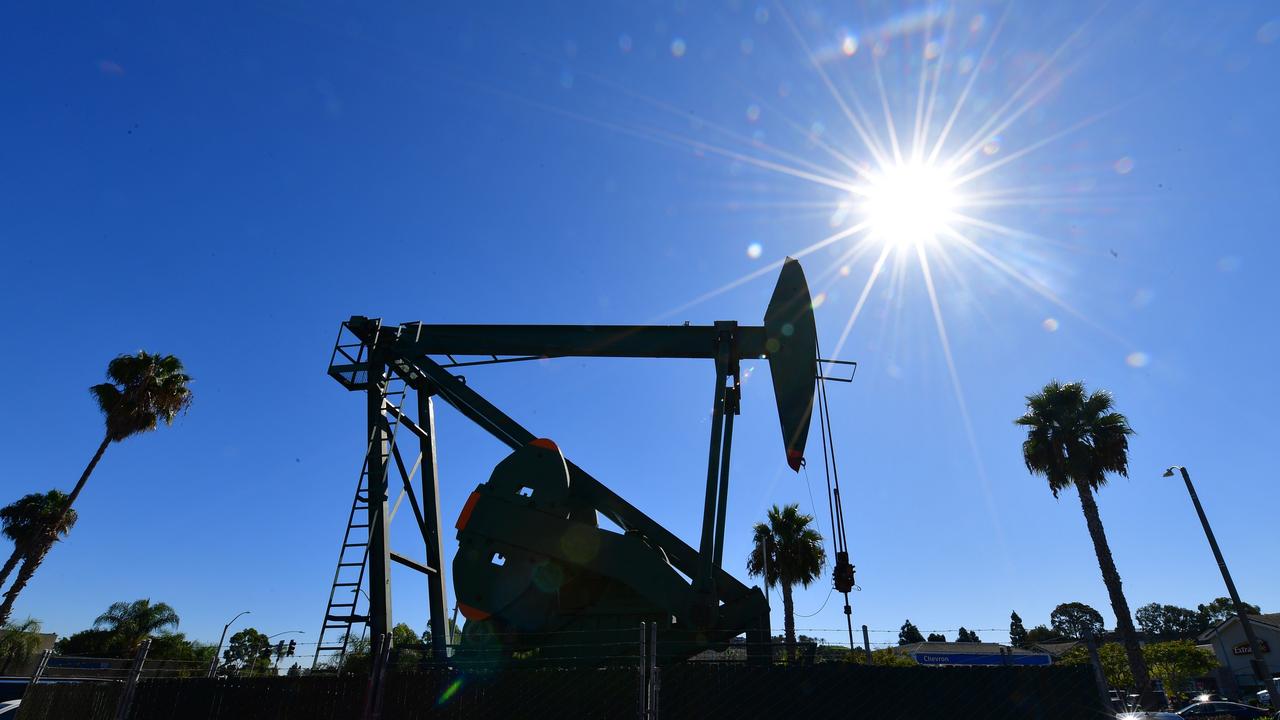Fears rising of oil price shock to global economy
Russia’s military support for separatist parts of Ukraine and preparedness to invade have increased the risk of an oil price shock.

Business
Don't miss out on the headlines from Business. Followed categories will be added to My News.
Russia’s military support for separatist parts of Ukraine and preparedness to invade the nation have increased the risk of an oil price shock and a further sell-off in the global sharemarket.
But while favouring commodities, analysts said sharemarket falls are likely to be temporary.
The dollar hit a two-week high of US72.41c after Brent crude oil touched a 6½-year high of $US99.50 a barrel, after Russia sent “peacekeeping” forces to eastern Ukraine – starting an “invasion”, according to US President Joe Biden and prompting sanctions from Western nations.
But with the first round of sanctions falling well short of crippling Russian banks and cutting the country off from the global economy, European and US sharemarkets didn’t fall as much as expected on Tuesday and futures were pointing to gains of more than 0.5 per cent overnight on Wednesday.
Australia’s S&P/ASX 200 index rose 0.6 per cent to 7205.7 points as this month’s outperformance on the back of a much better than expected corporate earnings season continued.
But the escalation of geopolitical risk this week “materially increased the risk of further aggravating the energy and commodity crisis developing over the past two years”, with “potential trade disruptions of oil, gas, grains and metals now a “significant risk for investments and the real economy”, according to JPMorgan’s global markets strategists led by Marko Kolanovic.
“Portfolio managers should hedge this risk by increasing allocations to commodities, energy and materials,” they said.
“These allocations would serve as a hedge to inflation, geopolitical risks, and Covid reopening in what we see as a continued cycle of economic expansion.”
A sharp contraction in commodity inventories and China’s dominant share of global commodity consumption meant “low levels of tradeable inventories have left us with few shock absorbers, which could drive nonlinear commodity price increases, particularly in light of our base case of a further rise in geopolitical tensions”, the strategists said in a report.
If and when the geopolitical risks faded, they saw “big upside potential for Russian equities given their dislocation with oil prices”, although oil prices would probably ease.
While global equities have fallen this year on the back of rising bond yields amid the highest US inflation in four decades and expectations of rapid-fire Fed rate increases, they said initial volatility caused by the start of US rate rises doesn’t tend to last.
Historically, the sharemarket has tended to make all-time highs within two to four quarters.
“The start of policy tightening is usually a confirmation that the cycle has legs, rather than the signal of its end,” they said.
“As we don’t see the yield curve inverting or real yields reaching problematic levels this year, it is premature to talk about end-of-cycle worries.
“That said, there is cause for caution as the path for optimal monetary policy is narrow in the current backdrop.”
S&P Global Platts chief geopolitical adviser Paul Sheldon said that in the event of military incursion, US financial sanctions could cause dislocations due to caution among oil buyers, while risks of disruptive cyberattacks would also rise.
He didn’t expect a notable curtailment of oil exports, either from US sanctions or Russia holding back supply, as it would jeopardise market share and longer-term economic interests.
“But markets will understandably remain tense, as global spare capacity ex-Russia is currently 2.6 million barrels per day and will fall to 1.8 million barrels per day by May,” he said.
In the unlikely scenario of a large Russian supply interruption, he said talk would shift to the potential for additional strategic petroleum reserve releases from the US and elsewhere.
With Ukraine tensions escalating, the sharemarket now faces a “high risk” of falls on fear of further escalation and uncertainty about the impact of sanctions on Russia and European gas supplies, but the history of crisis events shows a short-term hit followed by a rebound over three to 12 months, according to AMP Capital’s chief economist Shane Oliver.
He said the overall negative market reaction this week reflects a combination of uncertainty around how far the conflict will go – with Ukraine being Europe’s second biggest country after Russia, the threat of further sanctions and uncertainty about how severe their economic impact will be.
“Although it has said it won’t, there is also the risk Russia cuts off gas supply to Europe where prices are already very high, with a potential flow-on to oil demand at a time when conflict may threaten supply,” Dr Oliver said. “In short, investors are worried about a stagflationary shock to Europe and, to a lesser degree, the global economy generally.”
But given the difficulty in timing market reactions to geopolitical developments he said the best approach for most investors was to stick to an appropriate long term investment strategy.
Dr Oliver’s analysis of the impact on the US sharemarket crisis events including wars, terrorist attacks and financial crises showed it fell by an average of 3 per cent before recovering by an average of 6 per cent over three months, 9 per cent over 12 months and 18 per cent over one year.
A Russian invasion of all of Ukraine with heavy sanctions, gas supplies cut and NATO military involvement would be a “large negative” for markets, causing falls of 15-20 per cent, as war in Europe would fully reverse the “peace dividend” that flowed from the end of the cold war in the 1990s. Markets could then take six to 12 months to recover.
But selling shares or switching to a more conservative investment strategy after a major fall just locks in a loss and trying to time the rebound was very hard, Dr Oliver said.
Originally published as Fears rising of oil price shock to global economy







